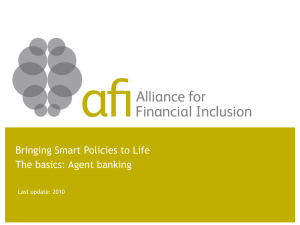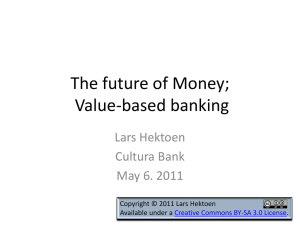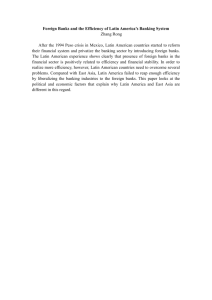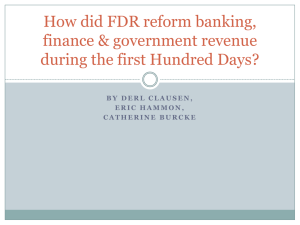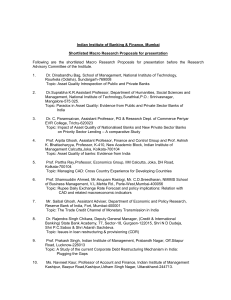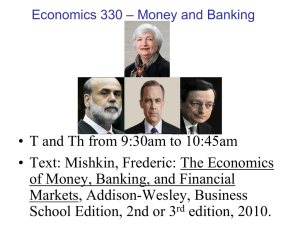70 - AISBOPEF .. All India State Bank of Patiala Employees Federation
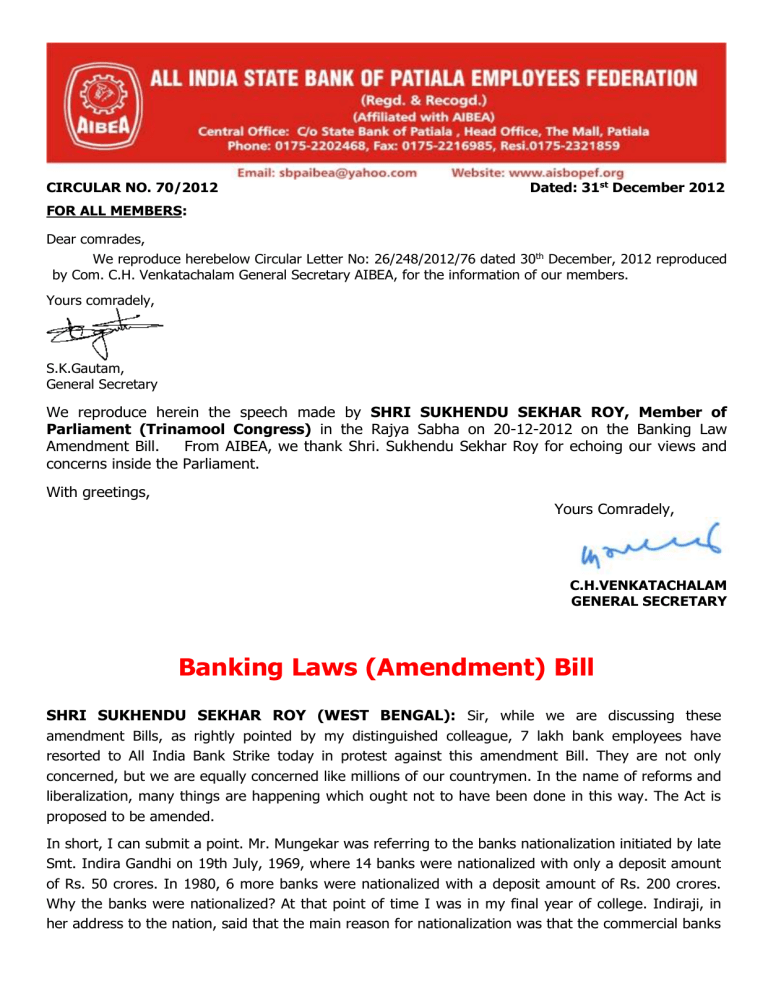
CIRCULAR NO. 70/2012 Dated: 31 st December 2012
FOR ALL MEMBERS:
Dear comrades,
We reproduce herebelow Circular Letter No: 26/248/2012/76 dated 30 th December, 2012 reproduced by Com. C.H. Venkatachalam General Secretary AIBEA, for the information of our members.
Yours comradely,
S.K.Gautam,
General Secretary
We reproduce herein the speech made by SHRI SUKHENDU SEKHAR ROY, Member of
Parliament (Trinamool Congress) in the Rajya Sabha on 20-12-2012 on the Banking Law
Amendment Bill. From AIBEA, we thank Shri. Sukhendu Sekhar Roy for echoing our views and concerns inside the Parliament.
With greetings,
Yours Comradely,
C.H.VENKATACHALAM
GENERAL SECRETARY
Banking Laws (Amendment) Bill
SHRI SUKHENDU SEKHAR ROY (WEST BENGAL):
Sir, while we are discussing these amendment Bills, as rightly pointed by my distinguished colleague, 7 lakh bank employees have resorted to All India Bank Strike today in protest against this amendment Bill. They are not only concerned, but we are equally concerned like millions of our countrymen. In the name of reforms and liberalization, many things are happening which ought not to have been done in this way. The Act is proposed to be amended.
In short, I can submit a point. Mr. Mungekar was referring to the banks nationalization initiated by late
Smt. Indira Gandhi on 19th July, 1969, where 14 banks were nationalized with only a deposit amount of Rs. 50 crores. In 1980, 6 more banks were nationalized with a deposit amount of Rs. 200 crores.
Why the banks were nationalized? At that point of time I was in my final year of college. Indiraji, in her address to the nation, said that the main reason for nationalization was that the commercial banks
facilitated concentration of economic power in the hands of a few and created monopoly in the country.
Priority sectors were neglected and banks did not pay attention to credit needs of farmers and SMEs; management lacked professional expertise; resources of banks were misused for the directors and their companies; and, bank credit was not made according to five-year development plan. These were the main reasons for the nationalization of banks. It contributed immensely to our national economy because in the early 80’s, the nationalization of banks contributed to 5-6 per cent growth of our country.
Because of nationalization of banks, in India today, the banks have nearly Rs.70 lakh crores as deposits; the bulk of which is the hard earned money of the common people.
Sir, with this amendment, I do not know whether we are going to protect the interests of the common depositors or we are opening the doors of our banking sector for the foreign players and the big corporates. That is the moot question involved in this Amendment Bill. From early 90’s, the rural credit deposit ratio has started declining sharply. The share of agriculture and SMEs in total bank credit has declined alarmingly. All this has happened in the name of reforms. I do not know whether this Bill will arrest that situation. I am putting a pointed question to the initiator of this Bill, hon. Finance Minister.
Side by side, if we look at the mal-administration and rampant corruption prevailing in the banking sector and the management at the top level, non-performing assets rose to around Rs. 1.17 lakh crores as on 31st March, 2012 compared to Rs. 74,16,074 crores as on 31st March, 2011. This figure was arrived at after writing off and restructuring the big loan amounts.
Sir, the actual amount of NPA will be well above 2.5 lakh crores of rupees according to experts; if we take into account the written-off amounts and the restructured amounts which are being drawn every year for the benefit of—what Mr. Sen has rightly pointed out-- the ‘big fish’, about 25 to 30 per cent of gross profit of the banking industry have been utilised every year to write off NPA and banks are increasing finance to restructure, which includes real estate, stock exchange and forward trading. Why am I saying so? Because, the American banking system has been suffering from the crisis of subprime lending. Our banking sector is heading towards that. This Amendment Bill will actually encourage the creation of the crisis of sub-prime lending in our country too. The Amendment Bill, according to us, Sir, is opening the doors to crony capitalism and the unscrupulous foreign players in the name of more investment in the banking sector. If we look at the amendments properly, we will find that by inserting new provisions and, by amending the old provisions, this Bill will pave way for unrealistic trade margin and resultant closure of branches whereas the need of the hour is opening up of new branches to serve the population, which does not have any access to banks. It is more so because no permission is required for the Competition Commission for merger of banks. This is highly unethical. What is the need of the Competition Commission? Wind up the Competition Commission.
This will also expose people’s money to unwarranted risks as bank security investment consists of savings of the people and these provisions allow these to be utilised by private corporates.
SHRI SUKHENDU SEKHAR ROY (CONTD): This will also allow the foreign investors to take over Indian private banks. This will be free-for-all-situation particularly for the foreign players. The voting rights and the shareholding pattern of private banks will increase manifold with higher voting rights and foreign direct investors which according to us will affect our banking sector manifold and the 'foreign direct intruders' - I call them foreign direct intruders, FDI -- will easily take over and control our private banks which have a total deposit of Rs.8,22,801 crores. Sir, by introducing this Bill, the present
Government has taken a U-turn from the path pursued by late Shrimati Indira Gandhi. I am referring to it because of bank nationalisation. This is the age of 'de-nationalisation'; this Government has introduced 'de-nationalisation' in every sector. Now it will cause a heavy cost for our banking sector too. Someone said that we are mango people living in a banana republic. He is correct to some extent, he is right to some extent because the way this Government is adopting policies one after another in the name of reforms may lead to a situation when we shall be compelled to feel that we are living essentially in a banana republic because all our policies are being dictated upon and we are adopting these measures at the behest of the foreign dictators, the foreign crony capitalists and we are adopting their policies which is not at all suitable for our body polity, for our society as a whole.
Knowing it fully well, we are introducing all such measures in the name of reforms just to satisify their plan of action. There we have serious objections. Our hon. Prime Minister has said that we are having outdated philosophy. In the Preamble to the Constitution of India, Indiraji also brought 'socialism' through 42nd Amendment. If this Government has the courage to write off, to shake off the outdated philosophy, then let the word 'socialism' be removed from the Preamble of the Constitution of India.
Let us see it, let the people of this country see it. First of all declare that the Preamble is an outdated philosophy and then you go for such reforms. Everything cannot be coined like this outdated philosophy. Socialism cannot be an outdated philosophy. If socialism has suffered setbacks in certain countries, it does not really mean that this philosophy is an outdated philosophy. We do not believe that, we believe in socialism. Swami Vivekanandaji, whose 150th anniversary..
MR. DEPUTY CHAIRMAN: Mr. Raja is very happy. ...(Interruptions)...
SHRI SUKHENDU SEKHAR ROY: Everybody should be happy. ...(Interruptions)... Everyone should be happy. It was Indiraji who pursued this. Unfortunately, the present rulers have forgotten Indiraji. The party which was known for Gandhiji, Nehurji and Indiraji that party is now known as the party of 2G,
CWG and CAG. It is unfortunate, an irony of fate. I will conclude my speech with a quotation from
Swami Vivekanandaji. We are going to observe 150th birth anniversary of Swami Vivekananda in
January next year. Once he said, "I believe in socialism not because it is the only way to reach the goal, but half a loaf is better than no bread."
SHRI SUKHENDU SEKHAR ROY (CONTD.): Therefore, Swamiji also believed that in Socialism half-aloaf is guaranteed, if not a full bread. But the way these Amendments are being brought, even half-aloaf is not guaranteed. It will be very difficult for the common man to earn their two times meal if our banking sector also suffers the advancement of the economic expansionism of the foreign players.
Therefore, Sir, according to...(Time-Bell)...
According to us, this Amendment Bill will transform our banking sector as a playground of big corporates and international crooks in the name of liberalization and reforms.
With these observations, I am opposing this Bill to the hilt. (Ends)

